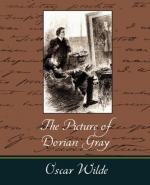It was rumoured of him once that he was about to join the Roman Catholic communion, and certainly the Roman ritual had always a great attraction for him. The daily sacrifice, more awful really than all the sacrifices of the antique world, stirred him as much by its superb rejection of the evidence of the senses as by the primitive simplicity of its elements and the eternal pathos of the human tragedy that it sought to symbolize. He loved to kneel down on the cold marble pavement and watch the priest, in his stiff flowered dalmatic, slowly and with white hands moving aside the veil of the tabernacle, or raising aloft the jewelled, lantern-shaped monstrance with that pallid wafer that at times, one would fain think, is indeed the “panis caelestis,” the bread of angels, or, robed in the garments of the Passion of Christ, breaking the Host into the chalice and smiting his breast for his sins. The fuming censers that the grave boys, in their lace and scarlet, tossed into the air like great gilt flowers had their subtle fascination for him. As he passed out, he used to look with wonder at the black confessionals and long to sit in the dim shadow of one of them and listen to men and women whispering through the worn grating the true story of their lives.
But he never fell into the error of arresting his intellectual development by any formal acceptance of creed or system, or of mistaking, for a house in which to live, an inn that is but suitable for the sojourn of a night, or for a few hours of a night in which there are no stars and the moon is in travail. Mysticism, with its marvellous power of making common things strange to us, and the subtle antinomianism that always seems to accompany it, moved him for a season; and for a season he inclined to the materialistic doctrines of the Darwinismus movement in Germany, and found a curious pleasure in tracing the thoughts and passions of men to some pearly cell in the brain, or some white nerve in the body, delighting in the conception of the absolute dependence of the spirit on certain physical conditions, morbid or healthy, normal or diseased. Yet, as has been said of him before, no theory of life seemed to him to be of any importance compared with life itself. He felt keenly conscious of how barren all intellectual speculation is when separated from action and experiment. He knew that the senses, no less than the soul, have their spiritual mysteries to reveal.
And so he would now study perfumes and the secrets of their manufacture, distilling heavily scented oils and burning odorous gums from the East. He saw that there was no mood of the mind that had not its counterpart in the sensuous life, and set himself to discover their true relations, wondering what there was in frankincense that made one mystical, and in ambergris that stirred one’s passions, and in violets that woke the memory of dead romances, and in musk that troubled the brain, and in champak that stained the imagination; and seeking often to elaborate a real psychology of perfumes, and to estimate the several influences of sweet-smelling roots and scented, pollen-laden flowers; of aromatic balms and of dark and fragrant woods; of spikenard, that sickens; of hovenia, that makes men mad; and of aloes, that are said to be able to expel melancholy from the soul.




